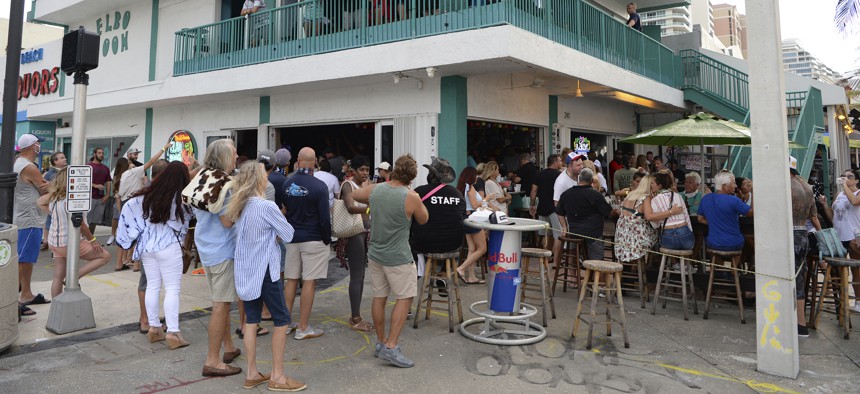Florida Lifts Covid Restrictions on Bars and Restaurants, While Prohibiting Local Mask Penalties

People seen partying at the Elbo Room in Fort Lauderdale as Florida Gov. Ron DeSantis announced on Friday that, effective immediately, Florida moves to phase 3 of coronavirus reopening plan with bars and restaurants potentially allowed at full capacity. AP Photo/mpi04/MediaPunch /IPX
STATE AND LOCAL NEWS ROUNDUP | Alaskan wildlife officials responding to more bear calls … Court cases could recognize more reservations in Oklahoma … New York City to allow al fresco dining past the end of October.
Florida Gov. Ron DeSantis issued an executive order Friday allowing restaurants and bars to open at full capacity and prohibiting local governments from collecting fines related to coronavirus mandates, including requirements that residents wear masks. The order, which DeSantis said moves the state into phase three of its reopening plan, also prevents local governments from closing businesses for public health reasons. "We're aso saying in the state of Florida everybody has a right to work," DeSantis said at a press conference. Local governments "can do reasonable regulations, but they can't just say no." Under the terms of the order, local governments can still regulate business operations, but can't close them outright due to concerns about the coronavirus. Any restrictions put in place must have economic and health justifications. After the governor’s announcement, Miami-Dade Mayor Carlos Gimenez said bars and nightclubs can open up, but the county wants to maintain its mask requirements inside establishments. It will, however, stop issuing citations. DeSantis' executive order will require the county to justify keeping restaurant capacity at 50%, which the Miami Herald reported many expected Gimenez to try to do. Hours after DeSantis’ order, Broward County issued its own saying bars have to comply with capacity restrictions. Some local leaders complained they didn’t see DeSantis’ order as backed by scientific guidance. “This is a political decision, clearly not inspired by an instinct to protect our residents or our economy. Preventing us from enforcing rules requiring mask usage is senseless and will only get more people sick,” Miami Beach Mayor Dan Gelber said. Meanwhile, state education officials told school superintendents in Miami-Dade and Broward counties that they need to move up plans to open in-person school. [Orlando Sentinel; Miami Herald; NBC Miami; Local 10]
A BEAR OF A PROBLEM | A poor berry crop and a lackluster year for salmon runs in Alaska have left bears there desperate to fatten themselves ahead of hibernation, forcing the animals to scour garbage cans in Juneau for adequate nutrition. The problem is worsened by this year’s “bumper crop” of young bears—the result of last year’s successful berry crop and salmon runs— leaving more animals to compete for a smaller amount of available food. Most of those bears are newly independent but still inexperienced enough to wander into busy areas occupied by humans, according to the Alaska Department of Fish and Game. So far this year, officials have responded to at least 687 bear-related calls, double the amount at the same point last year. [KTOO Public Media]
VACCINE PRIORITIZATION | Maryland Gov. Larry Hogan said Thursday that residents and staff members at nursing homes and assisted living facilities would be prioritized for the first round of Covid-19 vaccinations, along with health-care workers, essential employees, educators and public safety officials. Those priority candidates are among the most vulnerable to contracting Covid-19, Hogan said. The governor outlined the state’s early plan for vaccine distribution during scheduled remarks at Novavax Inc., a pharmaceutical company with a Covid-19 vaccine candidate in the second phase of development. The federal government will ultimately decide the prioritization of vaccine distribution, but Maryland’s plan adheres to a framework from the Johns Hopkins Center that includes health-care workers and older adults among those who might qualify for the first doses. [The Baltimore Sun]
OKLAHOMA RESERVATIONS | This summer’s Supreme Court decision upholding the United States’ treaties with the Muscogee (Creek) Nation, and therefore the tribe’s reservation, could lead to the recognition of four reservations of other tribes in Oklahoma. Experts said by the end of the year court cases could establish the reservations of the Cherokee, Chickasaw, Choctaw and Seminole Nations still exist. [The Oklahoman]
AL FRESCO, FOREVER | Restaurants in New York City can operate sidewalk and curbside dining areas indefinitely, and the city will continue to designate multiple blocks as pedestrian zones to increase foot traffic to businesses, Mayor Bill de Blasio said Thursday. The program, which helped restaurants stay open during the coronavirus pandemic, was originally set to expire at the end of October. Under the new rules, restaurants will be able to expand their outdoor seating areas in front of adjacent businesses if the owners and tenants agree. Restaurants that continue serving outdoors in the winter will have to keep those spaces open enough to allow adequate airflow. If the space is completely enclosed, dining areas must adhere to the same seating restrictions as indoor facilities, which are permitted to reopen at 25% capacity next week. De Blasio said the program will be “an important part of how we recover as a city” from the pandemic. [Eater NY]
Route Fifty managing editor Laura Maggi contributed to this roundup.
Kate Elizabeth Queram is a staff correspondent at Route Fifty.
NEXT STORY: Florida AG Calls for Probe of Push to Help People Vote by Paying Off Criminal Debts





